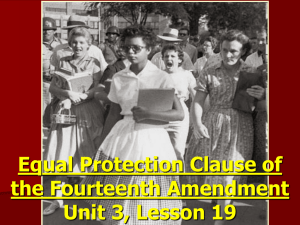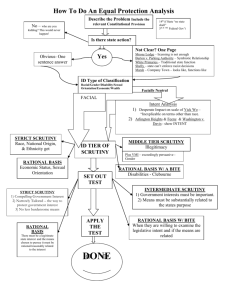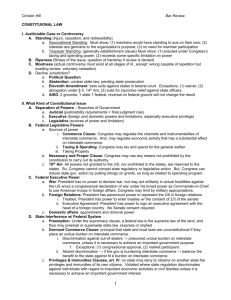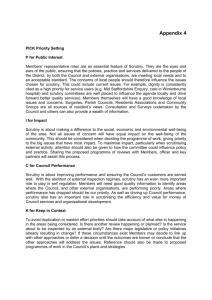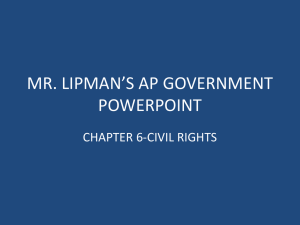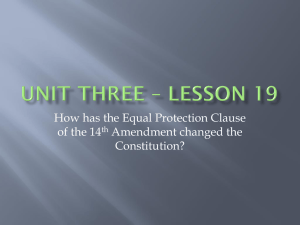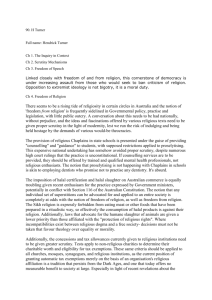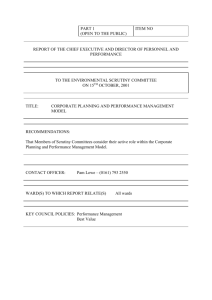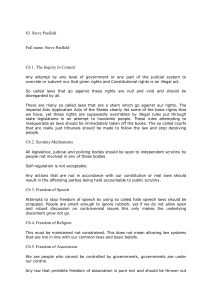Constitutional Law Condensed Review The Federal Judicial Power
advertisement
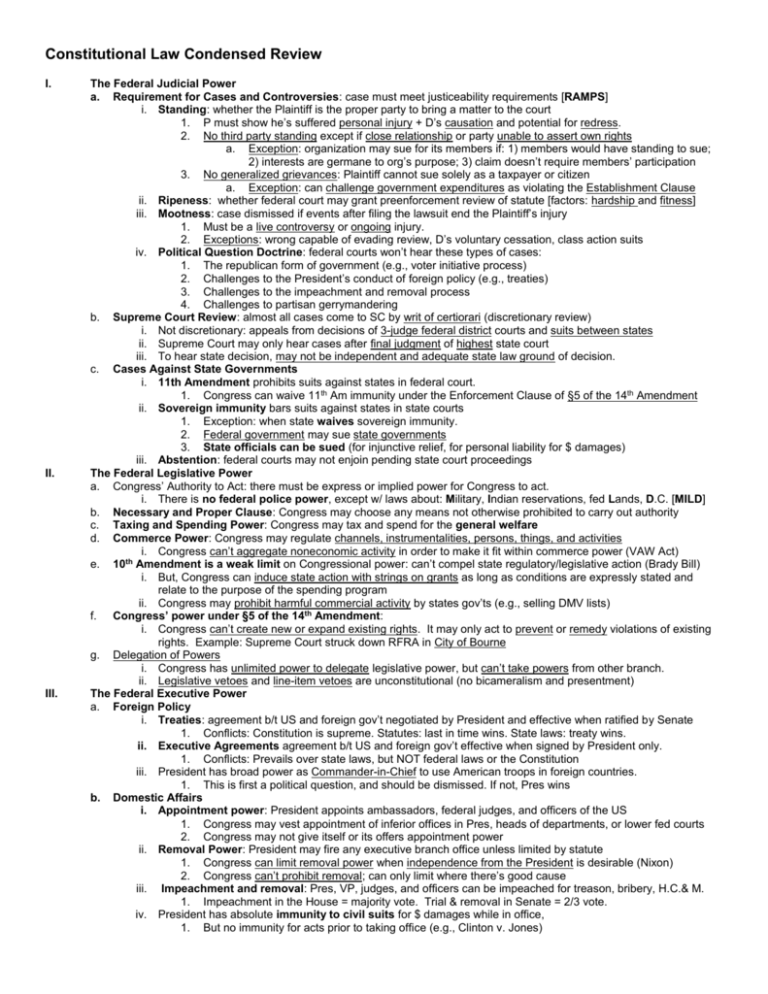
Constitutional Law Condensed Review I. II. III. The Federal Judicial Power a. Requirement for Cases and Controversies: case must meet justiceability requirements [RAMPS] i. Standing: whether the Plaintiff is the proper party to bring a matter to the court 1. P must show he’s suffered personal injury + D’s causation and potential for redress. 2. No third party standing except if close relationship or party unable to assert own rights a. Exception: organization may sue for its members if: 1) members would have standing to sue; 2) interests are germane to org’s purpose; 3) claim doesn’t require members’ participation 3. No generalized grievances: Plaintiff cannot sue solely as a taxpayer or citizen a. Exception: can challenge government expenditures as violating the Establishment Clause ii. Ripeness: whether federal court may grant preenforcement review of statute [factors: hardship and fitness] iii. Mootness: case dismissed if events after filing the lawsuit end the Plaintiff’s injury 1. Must be a live controversy or ongoing injury. 2. Exceptions: wrong capable of evading review, D’s voluntary cessation, class action suits iv. Political Question Doctrine: federal courts won’t hear these types of cases: 1. The republican form of government (e.g., voter initiative process) 2. Challenges to the President’s conduct of foreign policy (e.g., treaties) 3. Challenges to the impeachment and removal process 4. Challenges to partisan gerrymandering b. Supreme Court Review: almost all cases come to SC by writ of certiorari (discretionary review) i. Not discretionary: appeals from decisions of 3-judge federal district courts and suits between states ii. Supreme Court may only hear cases after final judgment of highest state court iii. To hear state decision, may not be independent and adequate state law ground of decision. c. Cases Against State Governments i. 11th Amendment prohibits suits against states in federal court. 1. Congress can waive 11th Am immunity under the Enforcement Clause of §5 of the 14th Amendment ii. Sovereign immunity bars suits against states in state courts 1. Exception: when state waives sovereign immunity. 2. Federal government may sue state governments 3. State officials can be sued (for injunctive relief, for personal liability for $ damages) iii. Abstention: federal courts may not enjoin pending state court proceedings The Federal Legislative Power a. Congress’ Authority to Act: there must be express or implied power for Congress to act. i. There is no federal police power, except w/ laws about: Military, Indian reservations, fed Lands, D.C. [MILD] b. Necessary and Proper Clause: Congress may choose any means not otherwise prohibited to carry out authority c. Taxing and Spending Power: Congress may tax and spend for the general welfare d. Commerce Power: Congress may regulate channels, instrumentalities, persons, things, and activities i. Congress can’t aggregate noneconomic activity in order to make it fit within commerce power (VAW Act) e. 10th Amendment is a weak limit on Congressional power: can’t compel state regulatory/legislative action (Brady Bill) i. But, Congress can induce state action with strings on grants as long as conditions are expressly stated and relate to the purpose of the spending program ii. Congress may prohibit harmful commercial activity by states gov’ts (e.g., selling DMV lists) f. Congress’ power under §5 of the 14th Amendment: i. Congress can’t create new or expand existing rights. It may only act to prevent or remedy violations of existing rights. Example: Supreme Court struck down RFRA in City of Bourne g. Delegation of Powers i. Congress has unlimited power to delegate legislative power, but can’t take powers from other branch. ii. Legislative vetoes and line-item vetoes are unconstitutional (no bicameralism and presentment) The Federal Executive Power a. Foreign Policy i. Treaties: agreement b/t US and foreign gov’t negotiated by President and effective when ratified by Senate 1. Conflicts: Constitution is supreme. Statutes: last in time wins. State laws: treaty wins. ii. Executive Agreements agreement b/t US and foreign gov’t effective when signed by President only. 1. Conflicts: Prevails over state laws, but NOT federal laws or the Constitution iii. President has broad power as Commander-in-Chief to use American troops in foreign countries. 1. This is first a political question, and should be dismissed. If not, Pres wins b. Domestic Affairs i. Appointment power: President appoints ambassadors, federal judges, and officers of the US 1. Congress may vest appointment of inferior offices in Pres, heads of departments, or lower fed courts 2. Congress may not give itself or its offers appointment power ii. Removal Power: President may fire any executive branch office unless limited by statute 1. Congress can limit removal power when independence from the President is desirable (Nixon) 2. Congress can’t prohibit removal; can only limit where there’s good cause iii. Impeachment and removal: Pres, VP, judges, and officers can be impeached for treason, bribery, H.C.& M. 1. Impeachment in the House = majority vote. Trial & removal in Senate = 2/3 vote. iv. President has absolute immunity to civil suits for $ damages while in office, 1. But no immunity for acts prior to taking office (e.g., Clinton v. Jones) v. IV. V. VI. President has executive privilege for presidential papers and conversations, except where there are other important governmental interests (e.g., criminal prosecution) vi. President has the power to pardon those accused or convicted of federal crimes (except those impeached) Federalism: limits on state/local power b/c of existence of federal government a. Preemption i. Supremacy Clause of Article III provides that Constitution and laws/treaties are the supreme law of the land ii. Express Preemption: when Congress says that federal law is exclusive iii. Implied Preemption exists in 3 cases: if laws are mutually exclusive, state law impedes fed law, or Congress expresses clear intent to preempt (e.g., immigration) 1. But, state may set stricter environmental standards than federal law unless Congress prohibits iv. States can’t tax/regulate federal gov’t activity (can’t place significant burden on fed gov’t) b. State Regulation of Commerce: states may not discriminate or unduly burden interstate commerce. i. Dormant Commerce Clause: state and local laws can’t places an excessive burden on interstate commerce. 1. Laws that burden interstate commerce are unconstitutional unless necessary to achieve important government purpose – except if Congress approves 2. Market participant exception: State/local government may prefer its own citizens in receiving benefits or dealing with government-owned businesses (e.g., in-state tuition, or state-owned factory) 3. Corporations and aliens CAN sue ii. Privileges and Immunities Clause of Article IV: states can’t discriminate against nonresidents with regard to civil liberties or important economic activities 1. Laws that discriminate against noncitizens are unconstitutional (e.g., Illinois mudflaps case) 2. If law discriminates against out-of-staters with regard to their ability to earn a livelihood, it is unconstitutional unless it is necessary to avhieve anviolates the Privileges and Immunities Clause of Article IV, unless necessary to achieve important government purpose a. Example: diff. cost for shrimp boat licenses violates P&I clause b. Example: diff. cost for elk-hunting licenses didn’t violate, b/c it’s a hobby 3. Corporations and aliens CANNOT sue iii. Privileges or Immunities Clause of the 14th Amendment: states can’t burden fundamental rights (right to travel) c. State Taxation of Interstate Commerce: can’t tax businesses to help in-state businesses i. State may only tax activities if there’s a substantial nexus to the state and fairly apportioned d. Full Faith and Credit: Courts in one state must give full faith and credit to judgments of courts in another state, so long as court has jurisdiction, judgment was final and on the merits Structure of the Constitution’s Protection of Individual Liberties a. State Action Doctrine: constitutional protections only apply to gov’t action (private conduct needn’t comply) i. Congress may apply constitutional norms to private conduct by statute via 13th Am and Commerce Clause Public Function Exception: if private entity is performing action traditionally and exclusively performed by gov ii. Entanglement Exception: Constitution applies if the government affirmatively authorizes, encourages, or facilitates activity. (e.g., providing free books to private school. NOT granting liquor license to discriminatory club) b. Incorporation: Bill of Rights has been incorporated into the Due Process Clause of the 14 th Am to apply to states i. All rights have been incorporated except: [2] right to bear arms, [3] right against forced quartering, [5] grand jury indictment in criminal cases, [7] jury trial in civil cases, [8] right against excessive fines c. Levels of Scrutiny i. Rational Basis Test: law upheld if rationally related to legitimate government purpose [any conceivable purpose] 1. Plaintiff has burden of proof to show no conceivable legitimate purpose or no rational relationship ii. Intermediate Scrutiny law upheld if substantially related to important government purpose [actual purpose] 1. The means chosen must be narrowly tailored (substantially related), but not the least restrictive 2. Government has the burden of proof. iii. Strict Scrutiny: law upheld if necessary to achieve compelling government purpose [actual purpose] 1. Means chosen must be least restrictive. 2. Government has the burden of proof Due Process a. Procedural Due Process: focuses on procedures taken when gov’t deprives life, liberty, property i. Deprivation of life, liberty or property occurs if there is loss of significant constitutional/statutory freedom a. Except in emergency, adult can be institutionalized must be notice and a hearing b. When parent institutionalizes a child, there must only be screening by a neutral fact finder. 2. Deprivation of property occurs if there is an entitlement (reasonable expectation of gov’t benefit) 3. Government negligence isn’t sufficient for a deprivation of due process. There must be intentional government action, or at least reckless action. a. In emergency situations, gov’t behavior must “shock the conscience” for it to be liable. i. Example: requires showing that the officer “intended” to cause harm. 4. Government’s failure to protect people from privately inflicted harms doesn’t deny Due Process. a. Gov’t only has affirmative duty if person in gov’t custody, or if gov’t creates the danger ii. Required Procedures: court will balance 1) importance of interest to individual, 2) ability of additional procedures to increase accuracy of fact-finding; 3) government’s interest in administrative efficiency. 1. Before welfare benefits terminated, must be notice and hearing 2. When social security disability benefits are terminated, only must be post-termination hearing 3. When student is disciplined by a public school, there must be notice of charges and opportunity to explain. No hearing 4. 5. b. Before parental rights can be permanently terminated, there must be notice and a hearing. Punitive damage awards require jury instructions and judicial review. Grossly excessive punitive damages violates DP 6. American citizen detained as enemy combatant must be given DP (Hamdi) 7. Except in exigent circumstances, prejudgment attachment, or government seizure of assets, must be preceded by notice and hearing. 8. But, government may seize property used in illegal activity, even if it has innocent owner Substantive Due Process: asks whether gov’t had adequate reason for depriving life, liberty, or property. i. Used to safeguard civil rights/privacy and for economic liberties. ii. Constitution provides only minimal protection for economic liberties: only rational basis is used. 1. Infringements on right to practice trade = rational basis review. 2. The takings clause: 5th Amendment – government may take private property for public use, but it must provide just compensation. [1-2 questions] a. Is there a taking? i. Possessory taking: government confiscation or physical confiscation of property is always a taking. Even small spaces count (e.g., cable TV boxes) ii. Regulatory taking: if government regulation leaves no economically viable use of the property. Not a taking simply b/c it reduces the value of property. 1. Government conditions on the development of property must be justified by benefit that is roughly proportionate to the burden imposed; otherwise it’s a taking. 2. Property owner may bring takings challenge to regulations that existed at the time the property was acquired (e.g., zoning ordinances). 3. Temporarily denying use is not a taking as long as action is reasonable. b. Is it for public use? i. If not for public use, government must give property back. ii. But, definition is so broad that virtually any use will meet standard. Taking is for public use as long as government acts out of belief taking will benefit public. c. Is just compensation paid? Measured in terms of loss to owner in reasonable market value terms. Gain to taker is irrelevant. iii. The Contracts Clause: “no state shall impair the obligations of contracts” 1. Applies only to state or local interference with existing contracts (fed = due process) a. Government CAN regulate future contracts 2. State or local interference with private contracts must meet intermediate scrutiny. a. Law must be reasonably and narrowly tailored to promote important and legitimate public interest. 3. State or local interference with government contracts must meet strict scrutiny. iv. The ex post facto clause doesn’t apply in civil cases – only applies to criminal cases. 1. This is a law that criminally punishes conduct that was lawful when it was done or that increases punishment for crime after it was committed. 2. Retroactive civil liability only need meet rational basis. v. Privacy is a fundamental right under substantive Due Process – strict scrutiny is used. 1. CAMPER: contraception, abortion, marriage, procreation, private education, family relations 2. Right to marry 3. Right to procreate 4. Right to custody of one’s children: a. Must show compelling reason to terminate custody. But, state may create irrebuttable presumption that married woman’s husband is the father of her child (Michael H. v. Gerald D.) 5. Right to keep the family together 6. Right to control the upbringing of one’s children a. Parent choosing parochial school is ok b. Court ordering grandparent visitation over parental objections not ok 7. Right to purchase and use contraception (Griswold v. CT) 8. Right to abortion (Roe v. Wade; Casey changed law) a. Prior to viability, government can’t prohibit abortion. Government can regulate abortions so long as it doesn’t create undue burden on ability to obtain abortions. (this replaced strict scrutiny as the test). i. 24-hour waiting period for abortions isn’t a undue burden ii. Requirement that abortions be performed by licensed physicians isn’t an undue burden iii. Prohibition of “partial birth abortions” is not an undue burden. Supreme Court upheld Federal Partial Birth Abortion Ban. b. After viability, prohibition OK unless necessary to protect woman’s life or health c. Doctor CAN sue on behalf of patient (3d party standing) d. Disclosure requirements are unconstitutional (compelled speech) e. Government has no duty to subsidize abortions or provide abortions in public hospital. f. Spousal consent and notification laws are unconstitutional. g. Parental notice and consent laws for unmarried minors are constitutional, as long as there’s an alternative judicial approval process. 9. Private consensual homosexual activity (Lawrence v. Texas) a. Court didn’t say which level of scrutiny should be used. 10. Right to refuse medical treatment a. Competent adults have the right to refuse medical treatment, even if it will save their life b. A state may require clear and convincing evidence that a person wanted treatment terminated before it is ended. c. State may prevent family members from terminating treatment for another. 11. No constitutional right to physician-assisted suicide VII. VIII. Equal Protection a. Sources of Equal Protection: applies to state/local gov’ts through the 14th Am. Fed gov’t = DP Clause of 5th Am. b. Race and National Origin Classifications: Strict Scrutiny i. For facially neutral laws, rational basis is used unless P can show discriminatory intent and disparate impact 1. Initial burden is on P to show discriminatory purpose, which raises presumption to strict scrutiny. ii. Racial classifications benefiting minorities: strict scrutiny 1. Numerical set-asides/quotas require clear proof of remedying past discrimination. 2. Educational institutions may use race as one factor among many in admissions decisions a. But, universities may not add points to admission scores solely on the basis of race. b. Cannot set aside slots or add points on basis of race. 3. Seniority systems may not be disrupted for affirmative action. c. Alienage Classifications: strict scrutiny (non-citizens) i. Alienage classifications that concern self-government and the democratic process get rational basis 1. Government may discriminate against non-citizens with regard to voting, serving on jury, being police officer, teacher, or probation officer. NOT notary public jobs – doesn’t have to do with self-gov’t. ii. Congressional discrimination: rational basis. Congress has plenary power to regulate immigration iii. Discrimination against undocumented alien children: intermediate scrutiny d. Gender Classifications: intermediate scrutiny if there is an “exceedingly persuasive justification” i. If facially neutral laws, rational basis unless P can show both discriminatory intent and discriminatory impact. 1. Discriminatory use of preemptory challenges based on gender denies equal protection. ii. Gender classifications benefiting women: intermediate scrutiny 1. Those classifications based on role stereotypes prohibited 2. Classifications designed to remedy past discrimination and differences in opportunity are allowed. e. Discrimination against non-marital children: intermediate scrutiny i. Laws that deny a benefit to all non-marital children, but grant it to all marital children, are unconstitutional. 1. Ex: only marital children can inherit from their fathers are unconstitutional f. All other discrimination: rational basis (gov’t wins) i. Age Discrimination: usually involves mandatory retirement law. ii. Disability: City of Cleburne: zoning regulation against group home iii. Wealth: poverty is not a suspect class iv. Economic regulations v. Sexual orientation discrimination g. Fundamental Rights Protected Under Equal Protection: Strict Scrutiny i. Right to Travel: Strict Scrutiny (laws that prevent people from moving into a state) 1. Durational residency requirements must meet strict scrutiny. (e.g., to receive welfare, must be there 1 year) a. Voting: 50 days is the maximum allowable requirement 2. Foreign travel: rational basis. 3. Restrictions on foreign travel need meet only the rational basis test. ii. Right to Vote: Strict Scrutiny 1. Laws that deny some citizens the right to vote must meet strict scrutiny a. Poll taxes (fees to vote) are unconstitutional b. Property ownership requirements are not allowed for voting or holding public office. The only place where property ownership is constitutional is with regard to a water district. 2. One-person one-vote must be met for all state and local elections. All districts must be about equal. 3. At-large elections are constitutional unless there is proof of a discriminatory purpose. 4. Race to draw election districts (even to benefit minorities) must meet strict scrutiny. 5. Counting uncounted votes w/o standards in a presidential election violates equal protection iii. There is no fundamental right to education. The First Amendment a. Content-based restrictions: strict scrutiny i. Subject matter restriction (application of the law depends on the topic of the message) ii. Viewpoint restrictions (application depends on ideology of speech) b. Content-neutral laws: intermediate scrutiny (e.g., “no parades allowed in city park.”) i. Time, place, manner restrictions are upheld unless they unduly constrict flow of speech. ii. 3-part test (akin to intermediate scrutiny) 1. Gov’t regulation must further an important (significant) government interest 2. Regulation must be narrowly tailored 3. Alternative channels of communication must be left open c. Content-based restrictions d. Prior Restraints: judicial order or administrative system that stops speech before it occurs IX. i. Court orders suppressing speech: strict scrutiny. 1. Procedurally proper court orders must be complied with until they are vacated or overturned. A person who violates a court order barred from later challenging it. 2. Gag orders on the press to prevent prejudicial pretrial publicity are not allowed. ii. The government may require license only if there is an important reason for licensing and clear criteria leaving almost no discretion to the licensing authority. 1. Schemes must contain procedural safeguards like prompt determination of request for license and judicial review. e. Vagueness and overbreadth i. Vagueness: unconstitutional if a reasonable person can’t tell what speech is prohibited and what is allowed. ii. Overbreadth: overbroad if it regulates substantially more speech than the Constitution allows to be regulated. iii. Fighting words laws are unconstitutionally vague and overbroad. But, words designed to incite imminent violence by a hostile audience are not protected. f. Symbolic Speech: may regulate if gov’t has important interest unrelated to suppression of the message and if the impact on communication is no greater than necessary to achieve the government’s purpose. 5 examples: i. Flag-burning is constitutionally-protected speech ii. Burning a cross is protected, unless it’s done with the intent to threaten. iii. Draft card-burning is not constitutionally-protected. Government has important interest in ensuring people had their draft cards to facilitate emergency deployment. iv. Nude dancing is not protected speech v. Contribution limits in an election campaign is constitutional; expenditure limits are unconstitutional. g. Unprotected Speech i. Incitement of Illegal Activity is unprotected if substantial likelihood of imminent illegal activity and the speech is directed to causing imminent illegality. ii. Obscenity and sexually-oriented speech 1. 3-Part Test for Obscenity a. The material must appeal to the prurient interest (shameful interest). Local standard. b. The material must be patently offensive under the law prohibiting obscenity. c. Taken as a whole, the material must lack serious redeeming value. National standard. 2. Zoning ordinances re: location of adult bookstores and movie theaters is OK. 3. Child pornography may be completely banned, even if not obscene. But, to be child pornography, actual children must be used in the production of the material. 4. Private possession of obscenity may not be punished, except for child pornography. 5. Government may seize the assets of businesses convicted of violating obscenity laws. iii. Profanity is protected, except over broadcast media or in schools iv. Commercial Speech: false and deceptive commercial speech is not protected 1. Examples: a. States may prevent professionals from advertising or practicing under a trade name b. The government may prohibit attorney, in-person solicitation or clients for profit. c. The government may not prohibit accountants from in-person solicitation of clients for profit 2. Other commercial speech can be regulated if intermediate scrutiny is met. a. Must be narrowly tailored, but doesn’t need to be the least restrictive alternative h. Defamation: libel and slander are not protected i. Public figure/official must prove falsity of statement and actual malice (D knew or acted in reckless disregard) ii. Private figures/matters of public concern: must prove falsity of statement and only negligence 1. However, P may recover presumed (automatic) or punitive damages only by showing actual malice. i. Privacy laws: gov’t can impose liability for truthful reporting of lawfully obtained information i. Liability is not allowed if the media broadcasts of a tape of an illegally intercepted call if the media did not participate in the illegality and it involves a matter of public importance. ii. Government may limit its own dissemination of information to protect privacy. j. No 1st Amendment protection for government employees on the job in the performance of their duties. k. Other government restrictions based on the content of speech must meet strict scrutiny. l. Places that are Available for Speech i. Public Forums: gov’t properties that the gov’t is required to make available for speech (parks, sidewalks) 1. Subject matter and viewpoint restrictions: strict scrutiny 2. Time, place, manner restrictions: intermediate scrutiny (3-part test: 1) important gov’t interest; 2) narrowly tailored; 3) leave alternate channels open for communication) 3. Least restrictive alternative NOT required 4. City officials cannot have discretion to set permit fees for public demonstrations. ii. Limited public forums: gov’t property it could close to speech, but leaves open – same rules as public forums iii. Non-public forums: gov’t MAY regulate speech as long as regulation is reasonable and viewpoint neutral. iv. Private property: regulations OK (e.g., shopping centers) Freedom of Association (fundamental right under the 1st Amendment) a. Prohibition on group membership: strict scrutiny. May punish member only if gov’t proves: i. Active affiliation with the group; and ii. Knowledge of the group’s illegal activities; and iii. Specific intent of furthering the group’s illegal activities b. Disclosure of membership lists: strict scrutiny, where such disclosure would chill association c. Prohibitions on group discrimination OK unless they interfere with intimate association or expressive activity. X. Freedom of Religion a. Free Exercise Clause: can’t be used to challenge neutral law of general applicability. i. Can’t be used to challenge a neutral law of general applicability ii. Government may not deny benefits to individuals who quit their jobs for religious reasons. b. Establishment Clause i. The Lemon test [SEX]: 1. There must be a Secular purpose for the law 2. Effect must be neither to advance nor inhibit religion. a. Government must not symbolically endorse religion or a particular religion. 3. There must not be eXcessive entanglement with religion (can’t pay parochial teacher salaries) ii. Government cannot discriminate against religious speech or among religions unless strict scrutiny is met. 1. If it discriminated against religious speech in favor of secular speech, it would be content-based, and thus strict scrutiny iii. Government-sponsored religious activity in public schools is unconstitutional. But religious student and community groups must have the same access to school facilities as non-religious groups. iv. The government may give assistance to parochial schools, so long as it is not used for religious instruction. The government may provide parents with vouchers that they may use in parochial schools.
